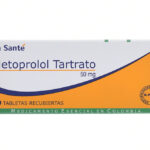Can Metoprolol Help You Sleep?

Sleep is an essential function that allows your body and mind to recharge, leaving you refreshed and alert when you wake up. Healthy sleep also helps the body remain healthy and stave off diseases. Without enough sleep, the brain cannot function properly.
According to the CDC, adults who sleep less than 7 hours each night are more likely to say they have had health problems, including heart attack, asthma, and depression. Some of these health problems raise the risk of heart disease, heart attack, and stroke. These health problems include:
During normal sleep, your blood pressure goes down. Having sleep problems means your blood pressure stays higher for a longer period of time. High blood pressure is one of the leading risks for heart disease and stroke. About 75 million Americans—1 in 3 adults—have high blood pressure.
However, many medications both prescription and over-the-counter drugs can affect your sleep routine.
What is metoprolol oral tablet?
Metoprolol is used alone or together with other medicines to treat high blood pressure (hypertension). High blood pressure adds to the workload of the heart and arteries. If it continues for a long time, the heart and arteries may not function properly. This can damage the blood vessels of the brain, heart, and kidneys, resulting in a stroke, heart failure, or kidney failure. High blood pressure may also increase the risk of heart attacks or strokes. These problems may be less likely to occur if blood pressure is controlled.
Metoprolol is also used to treat severe chest pain (angina) and lowers the risk of repeated heart attacks. It is given to people who have already had a heart attack. In addition, metoprolol is used to treat patients with heart failure.
This medicine is a beta-blocker. It works by affecting the response to nerve impulses in certain parts of the body, like the heart. As a result, the heart beats slower and decreases blood pressure. When the blood pressure is lowered, the amount of blood and oxygen is increased in the heart.
Metoprolol is available in these two forms, which are described in more detail below:
- immediate-release tablets, called metoprolol tartrate
- extended-release tablets, called metoprolol succinate
Both of these forms of metoprolol can be used to:
- prevent angina (a type of chest pain)
- treat high blood pressure
Additionally, metoprolol succinate is used to treat heart failure. And metoprolol tartrate is used to treat a heart attack or prevent one from occurring in the future.
Both metoprolol succinate and metoprolol tartrate can be used in adults. In addition, metoprolol succinate can be used in some children with high blood pressure.
Metoprolol tartrate is an immediate-release tablet, which means it works right away after you take it. Metoprolol succinate, on the other hand, is an extended-release tablet. It works consistently over a period of time after you take it.
How should I take metoprolol?
As stated above, metoprolol comes as a tablet and an extended-release (long-acting) tablet to take by mouth. The regular tablet is usually taken once or twice a day with meals or immediately after meals. The extended-release tablet is usually taken once a day. To help you remember to take metoprolol, take it around the same time(s) every day. Follow the directions on your prescription label carefully, and ask your doctor or pharmacist to explain any part you do not understand. Take metoprolol exactly as directed. Do not take more or less of it or take it more often than prescribed by your doctor.
The extended-release tablet may be split. Swallow the whole or half tablets whole; do not chew or crush them.
Your doctor may start you on a low dose of metoprolol and gradually increase your dose.
Metoprolol controls high blood pressure and angina but does not cure them. Metoprolol extended-release tablets control heart failure but do not cure it. It may take a few weeks before you feel the full benefit of metoprolol. Continue to take metoprolol even if you feel well.
Can metoprolol help you sleep?
Yes, metoprolol may help you sleep better because it causes drowsiness also called excess sleepiness. This is often accompanied by lethargy, weakness, and lack of mental agility. Do not drive a car or operate machinery until you know how this metoprolol affects you. Also, remember that alcohol can add to the drowsiness caused by metoprolol.
If you have high blood pressure or a heart condition that is preventing you from getting good sleep, discuss it with your doctor or health care provider. The following tips can also help you get better sleep:
- Stick to a regular sleep schedule. Go to bed at the same time each night and get up at the same time each morning, including on the weekends.
- Get enough natural light, especially earlier in the day. Try going for a morning or lunchtime walk.
- Get enough physical activity during the day. Try not to exercise within a few hours of bedtime.
- Avoid artificial light, especially within a few hours of bedtime. Use a blue light filter on your computer or smartphone.
- Don’t eat or drink within a few hours of bedtime; avoid alcohol and foods high in fat or sugar in particular.
- Keep your bedroom cool, dark, and quiet.
Work with your health care team to identify obstacles to good sleep, including other medical conditions.





